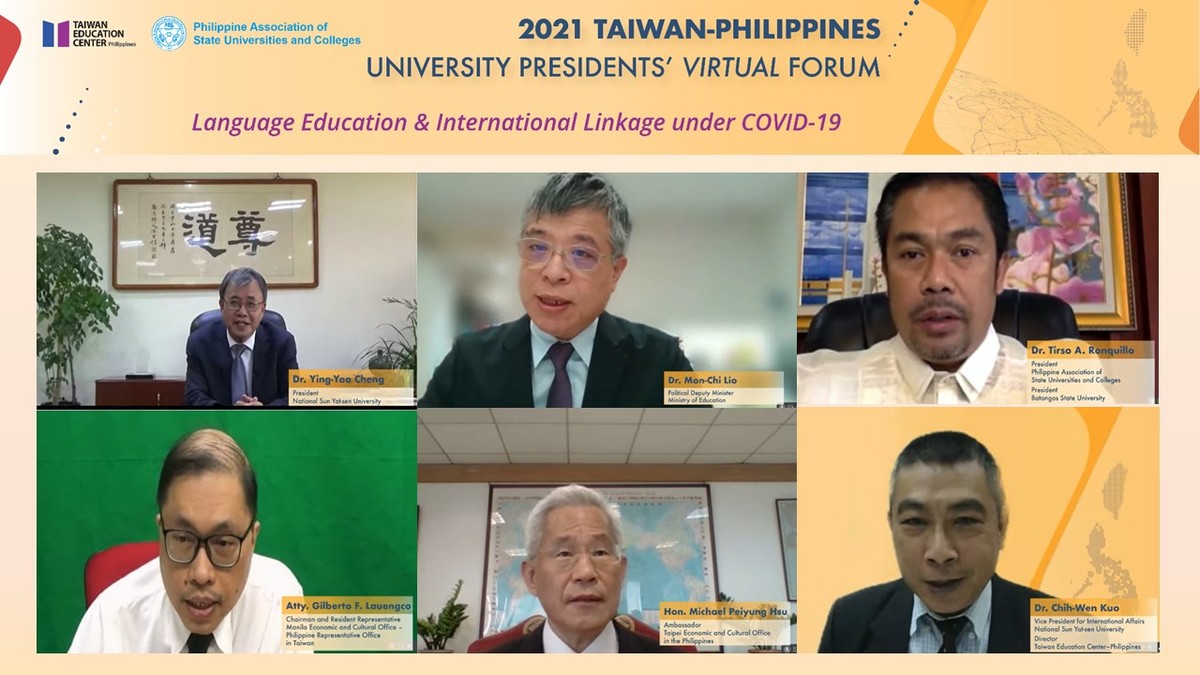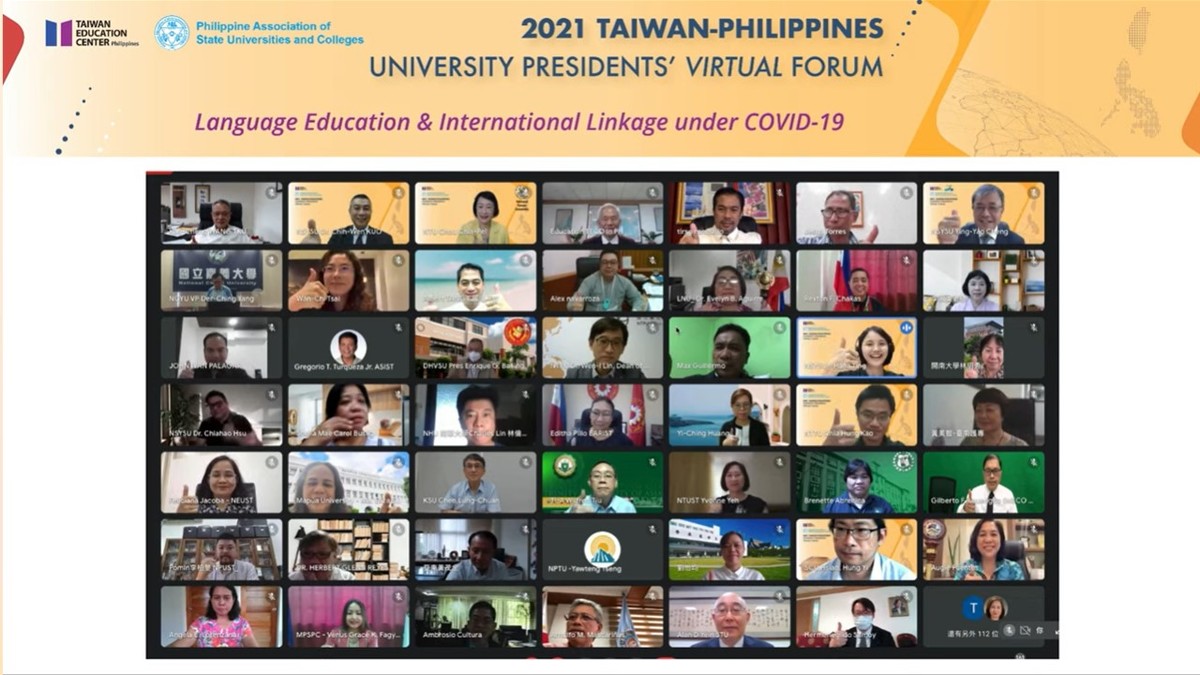Over 200 leaders of higher education in Taiwan and the Philippines discuss bilingual education in virtual forum


2021-08-31
The Philippine Association of State Universities and Colleges (PASUC) and the Taiwan Education Center (TEC) – Philippines co-hosted the 2021 Taiwan-Philippines University Presidents' Virtual Forum online for the first time due to the pandemic. The participating guests included NSYSU President Ying-Yao Cheng, Chairperson of Commission on Higher Education (CHED) Prospero E. De Vera III, MOE (Ministry of Education) Political Deputy Minister Mon-Chi Lio, PASUC President Tirso Ronquillo, Representative of Taipei Economic and Cultural Office (TECO) in the Philippines Michael Peiyung Hsu, the Philippine’s Representative to Taiwan Gilberto F. Lauengco, and Director-General of the Department of International and Cross-strait Education of MOE Nicole Yen-Yi Lee. Over 230 participants, representing 63 Taiwanese and 107 Filipino higher education institutions, shared experience through an online platform and YouTube livestream on bilingual and language education and discussed innovative measures in higher education under the pandemic.
The theme of the Forum was “Language Education and International Linkage under COVID-19.” PASUC President Dr. Tirso Ronquillo stated in the opening remark that he hopes that this Forum would “be a guide to catapult all of us in full throttle in the realization of our quest for knowledge sharing and global academic greatness.” CHED Chairperson Dr. Prospero E. De Vera III discussed how the Philippines dealt with the impact of the pandemic on higher education and what measures were implemented to maintain school operation and the quality of education.
Another focal point was on experiences of language education in Taiwan and the Philippines as the two countries become bilingualized. NSYSU President Dr. Ying-Yao Cheng stressed that globalization is a critical challenge that universities will face in the future. NSYSU, as a leading university in southern Taiwan, pioneered the transformation into an all-English university, with a related 10-year project launched two years ago. President Cheng said that Taiwan can recruit English language teaching talents from the Philippines, and provide Mandarin language teachers to the Philippines; he envisioned both sides jointly nurturing talents in academics and language education with experience in Taiwan to bridge Taiwan and the Philippines. Director of TEC- - Philippines and Vice President for International Affairs at NSYSU Dr. Chih-Wen Kuo said that as Taiwan is becoming a bilingual nation, it shall collaborate with the Philippines to nurture expertise in the English language, as it is one of the official languages of the Philippines. Not only would the language learning exchange help Taiwan firmly lodge itself in the ASEAN region, but also advance its role on a global level. On the other hand, Taiwan can help the Philippines gain access to the broader sino-cultural sphere.
MOE Political Deputy Minister Dr. Mon-Chi Lio emphasized that the Philippines is one of Taiwan’s strategic partners in the New Southbound Policy. During a working meeting on higher education between the two countries last September, the discussion explored the possibility of exchanging English and Mandarin teaching assistants and sending primary and secondary teachers from Taiwan for intensive English-language training in the Philippines. Unfortunately, the plan was temporarily put on hold due to the pandemic and shall resume as soon as conditions permit. Taiwan’s Representative to the Philippines Michael Hsu stated that TECO in the Philippines has remained in close contact with universities in the Philippines and facilitated various bilateral projects, such as recruiting Filipino students for internships at Academia Sinica and the Taiwan Experience Education Program (TEEP) to enhance their professional capabilities. In the near future TECO also plans to organize a leadership program in Taiwan for Filipino higher education executives.
Worth mentioning was the talk on decades of educational transition to bilingual and multilingual policy in the Philippines stimulated enthusiastic and interesting dialogues. Innovative approaches through technology and the internet shall bring about solutions for all of us around the globe in facing together the "new normal" of the pandemic era, since academic exchange and education cannot be put on hold.
The Philippine Association of State Universities and Colleges (PASUC) and the Taiwan Education Center (TEC) – Philippines co-hosted the 2021 Taiwan-Philippines University Presidents' Virtual Forum online for the first time due to the pandemic. The participating guests included NSYSU President Ying-Yao Cheng, Chairperson of Commission on Higher Education (CHED) Prospero E. De Vera III, MOE (Ministry of Education) Political Deputy Minister Mon-Chi Lio, PASUC President Tirso Ronquillo, Representative of Taipei Economic and Cultural Office (TECO) in the Philippines Michael Peiyung Hsu, the Philippine’s Representative to Taiwan Gilberto F. Lauengco, and Director-General of the Department of International and Cross-strait Education of MOE Nicole Yen-Yi Lee. Over 230 participants, representing 63 Taiwanese and 107 Filipino higher education institutions, shared experience through an online platform and YouTube livestream on bilingual and language education and discussed innovative measures in higher education under the pandemic.
The theme of the Forum was “Language Education and International Linkage under COVID-19.” PASUC President Dr. Tirso Ronquillo stated in the opening remark that he hopes that this Forum would “be a guide to catapult all of us in full throttle in the realization of our quest for knowledge sharing and global academic greatness.” CHED Chairperson Dr. Prospero E. De Vera III discussed how the Philippines dealt with the impact of the pandemic on higher education and what measures were implemented to maintain school operation and the quality of education.
Another focal point was on experiences of language education in Taiwan and the Philippines as the two countries become bilingualized. NSYSU President Dr. Ying-Yao Cheng stressed that globalization is a critical challenge that universities will face in the future. NSYSU, as a leading university in southern Taiwan, pioneered the transformation into an all-English university, with a related 10-year project launched two years ago. President Cheng said that Taiwan can recruit English language teaching talents from the Philippines, and provide Mandarin language teachers to the Philippines; he envisioned both sides jointly nurturing talents in academics and language education with experience in Taiwan to bridge Taiwan and the Philippines. Director of TEC- - Philippines and Vice President for International Affairs at NSYSU Dr. Chih-Wen Kuo said that as Taiwan is becoming a bilingual nation, it shall collaborate with the Philippines to nurture expertise in the English language, as it is one of the official languages of the Philippines. Not only would the language learning exchange help Taiwan firmly lodge itself in the ASEAN region, but also advance its role on a global level. On the other hand, Taiwan can help the Philippines gain access to the broader sino-cultural sphere.
MOE Political Deputy Minister Dr. Mon-Chi Lio emphasized that the Philippines is one of Taiwan’s strategic partners in the New Southbound Policy. During a working meeting on higher education between the two countries last September, the discussion explored the possibility of exchanging English and Mandarin teaching assistants and sending primary and secondary teachers from Taiwan for intensive English-language training in the Philippines. Unfortunately, the plan was temporarily put on hold due to the pandemic and shall resume as soon as conditions permit. Taiwan’s Representative to the Philippines Michael Hsu stated that TECO in the Philippines has remained in close contact with universities in the Philippines and facilitated various bilateral projects, such as recruiting Filipino students for internships at Academia Sinica and the Taiwan Experience Education Program (TEEP) to enhance their professional capabilities. In the near future TECO also plans to organize a leadership program in Taiwan for Filipino higher education executives.
Worth mentioning was the talk on decades of educational transition to bilingual and multilingual policy in the Philippines stimulated enthusiastic and interesting dialogues. Innovative approaches through technology and the internet shall bring about solutions for all of us around the globe in facing together the "new normal" of the pandemic era, since academic exchange and education cannot be put on hold.
Click Num:
Share
